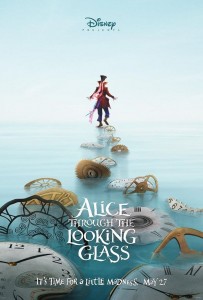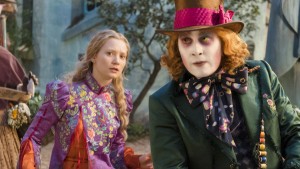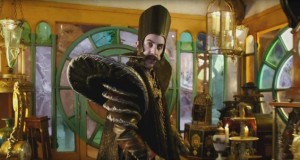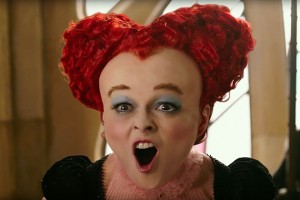
James Bobin has the unenviable task of replacing Tim Burton as director for the sequel to “Alice in Wonderland.” This means he has to carry the mantle of Burton’s bizarre wonderland, which is no easy feat. He also has to juggle the vibrant characterizations with an intricate time travel story, while also incorporating social commentary and the usual Disney uplifting message. I almost hate to criticize Bobin, as this was a tall order, one that most men would befall to.
I can understand why Bobin was chosen to take over Alice’s escapades, as he successfully brought the Muppets back with their last two film adventures. James had a better understanding on what made the Muppets work, not what made Burton’s Wonderland caricatures work. To be fair, even Burton himself didn’t quite understand what made his variation work, with his vision being muddied by the original film’s end. This will wind up being one of the kinder negative reviews of “Alice Through the Looking Glass,” as I feel sorry for Bobin in having to direct this incoherent mess.

The overwrought story follows Alice (Mia Wasikowska) as she is recruited back to Wonderland by Absolem (Alan Rickman, whose voice is nice to hear for the last time) to save the Mad Hatter (Johnny Depp). The Mad Hatter’s dilemma is himself, as he’s found a family relic of his in the forest. This causes him to believe that his parents, once believed to have perished at the hands of the Red Queen (Helena Bonham Carter), are still alive. Whenever someone tells him otherwise, he shuts them out. The White Queen (Anne Hathaway) was hopeful that Alice’s arrival would reignite Mad Hatter’s liveliness, but to no avail.
The new plan is for Alice to travel back in time to prevent the Mad Hatter’s parents from perishing. To do so, she needs to convince Time himself (Sacha Baron Cohen) to allow her to borrow his Chronosphere to do so. He declines in villainous fashion, even though his reasoning his sound. If Alice were to change the past, it would destroy Wonderland as we know it (as opposed to simply altering the future). All the while, the Red Queen, who Time is unrequitedly in love with, wants to prevent Alice from saving the Mad Hatter, instead wanting to change her tragic past. Wonderland doesn’t need Alice; it needs a good psychiatrist. And the only psychiatrists we see are in the real world and they serve no purpose whatsoever. Actually, anything involving the real world seems pointless.

I shall faintly defend James Bobin once again, arguing that he also the unenviable task of adapting Linda Woolverton’s sloppy screenplay to screen. It is Linda who seemingly doesn’t understand the message of the story, or at least wants to tack a cheerier Disney approach onto it. The message of the story is to learn from one’s past mistakes to become a better person in the present. Time is not a wretched curse that takes away our loved ones, but a reservation to celebrate our loved ones inside of. All of the revelations about the past are weak, with the Red Queen’s descent into madness being downright laughable. The message itself flounders because any and all dramatic heft is tossed aside for a forced happy ending that doesn’t compliment the message. Bobin does his best to instill the message regardless, but it’s a losing fight.
Where I will criticize Bobin is in making the majority of the characters unbearable. Again, this is slightly Tim Burton’s fault, as his eccentric personalities for them towed the line of obnoxiousness in the first. Here the line is tipped over and the likes of the Mad Hatter and Tweedledee and Tweedledum (Matt Lucas) are grating, not charming. At least the Mad Hatter gets to tone down his personality to show sorrow for his long-lost family. This is and Mia Wasikowska’s delightful performance are the only two elements of the one film one can easily grasp onto and enjoy.

James Bobin fought an uphill battle to bring “Alice Through the Looking Glass” to life and he unfortunately fails to do so. It’s not for a lack of trying, but it’s a fight that seemingly wasn’t worth engaging in. The film is colorful enough, so much so that children will forgive its shortcomings. The adults, however, may find themselves too annoyed by the characters and the convoluted story to ever connect with it.
Final Rating: C-
